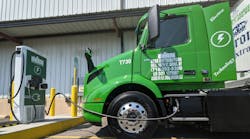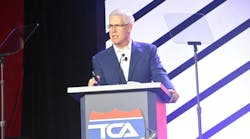While trucking lobbies opposed to the new U.S.-Mexico cross-border truck pilot program, have been more than vocal—even to the point of one having filed a federal suit against the bilateral agreement—there’s at least one expert on this segment of international trade who sees the deal struck by Mexico President Felipe Calderón and President Barack Obama in a clearly positive light.
For starters, Troy Ryley, managing director of Transplace Mexico, told FleetOwner that once Mexican carriers are enrolled in the pilot program, Texas “could become a center for distribution as Mexican trucks won’t be going far north unless they have backhauls secured, which will be difficult as Mexican carriers will not be allowed to carry U.S. domestic freight.” In addition, he said the presence of new terminal operations set up by Mexican carriers on the U.S. side of the border could help relieve some of the [freight] capacity issues in Dallas, Houston, San Antonio, Tucson and Albuquerque.”
Ryley pointed out that Transplace’s market expertise in this arena rests on it being a leading non-asset based third-party logistics (3PL) services provider and a “Top 10 freight capacity broker” in the U.S. with deep experience aiding customers shipping to Mexico and beyond.
Speaking to the very guts of the agreement in terms of free-trade fairness, Ryley remarked that “Keeping Mexican carriers out would be like the U.S. keeping out all the international airlines” that have landing rights here. “Every country in the world flies in here, but somehow we cannot put Mexican trucks on our roads?
“The reality is,” he continued, [that Mexican carriers] buy from the same trucking suppliers [as U.S. fleets] and many of the trucks run here today were built in Mexico. The capabilities are there [in Mexico] and that includes driving trucks.”
According to Ryley, a “huge fallacy” he’s heard is that people will see Mexican trucks “driving straight through to Chicago” with the inference being they are going after U.S. domestic freight. “That won’t happen because thanks to Mexican customs laws and our own post-9/11 security measures, they have to stop first and deal with a very inefficient border crossing [handled now mainly by local Mexican drayage operations].
“But a Mexican carrier won’t have a high-dollar U.S.-certified tractor-trailer sitting on a bridge for 12 hours waiting to cross,” he pointed out. “Rather,[their] Mexican trailer will be shuttled across by drayage tractor and hooked up with a Mexican tractor located on our side of the border [at a terminal set up by the Mexican carrier] which would then head out to complete its delivery and seek out a nearby backhaul to Mexico.” This, he explains, would be necessary as the Mexican operators will want to keep control of their trailers while they are on the U.S. side.
And if that does becomes the scenario, any Mexican carrier joining the pilot program will have to make investments in tractors, terminals and also in its employees-- as Mexican truck drivers will face greater scrutiny on this side of the border than their American counterparts do. In other words, the Mexican fleets that want to take advantage of the pilot program will be operations with the needed funds and management foresight to make their investment pay off—not the “fly-by-night” type operators critics like to claim they would be.
“There will be a positive impact beyond more capacity,” added Ryley. “These Mexican carriers setting up shop here will be a windfall for U.S. truck sales.”




